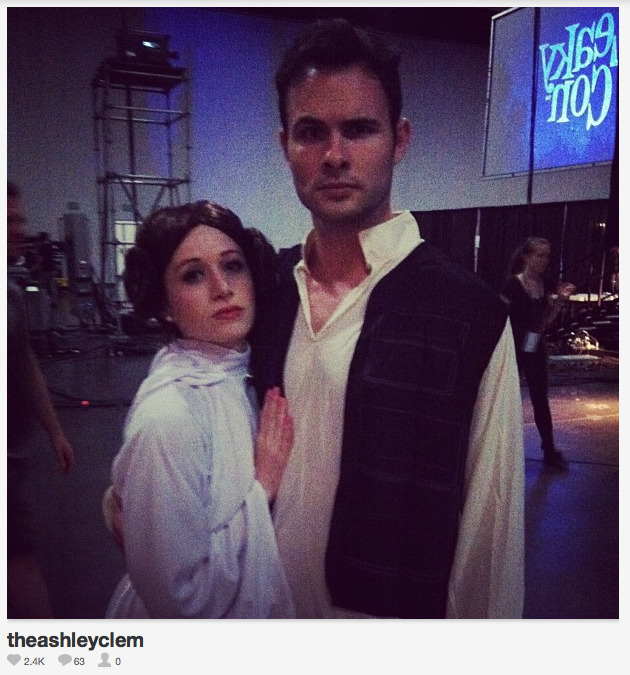Fans and Stars and Starkids (LeakyCon Portland)
 This is the third of a seven-part series about the 4th LeakyCon convention held in Portland Oregon June 27-30, 2013.
This is the third of a seven-part series about the 4th LeakyCon convention held in Portland Oregon June 27-30, 2013.
What perhaps struck me most about LeakyCon was the fluid approach to celebrity on display throughout. I first noticed celebrity as a theme in an early session on millennials and religion. In this session, led by Reverend Heather Godsey, the mostly millennial-age audience discussed the motivating inspiration they find in the “Starkids” theater troupe, made famous for their musical theater adaptation of Harry Potter into A Very Potter Musical (AVPM). AVPM (and its two sequels, the last of which debuted at LeakyCon, 2012) are lynchpins of the Con, and the large Starkids cast may very well be the con’s most beloved stars. Fans expressed admiration for the Starkids troupe, but not a distanced idolization. Fans conveyed a sense of intimate recognition; they saw the Starkids as modeling an accessible way of being (creative) in contemporary digital culture. In Reverand Godsey’s words:
It’s funny, in corporate fandom, like Doctor Who or Glee, there’s this sense that these are my idols; they’re on a pedestal; they’re up there. There’s a sense that Starkid is not on a pedestal. That the fandom looks at them, and says, “You are me. And I am you.”
The fifty or so young adults gathered in the room were eager to respond to this perspective. One audience member commented on the fan terminology “Starkid” itself, which encompasses both the theater troupe and their fans: “I kind of think that’s the reason why Starkid fandom just calls themselves Starkids.” This comment marks a difference between the Starkids fan self-conception and the majority of fan terminology in which terms for a fandom (Whovian, Gleeks, Sherlockians) do not automatically encompass the producers of the source text. So Starkids (fans and troupe together) have co-created a shared network and, arguably, community.
The conversation among congoers in this session did not uncritically celebrate or accept as “authentic” this sense of likeness between Starkid Troupe members and fans.. While they agreed that they admire the Starkids and take pleasure in being part of the shared category, they emphasized the fact that this seeming accessibility masks more complex differentials. They described how as LeakyCon goers they must navigate a tricky terrain. They must figure out how to express admiration without erasing boundaries in such a seemingly intimate sphere. As another audience member put it:
In a way, that almost makes the fandom harder to navigate, though. Where it’s like: I admire you a lot, and I feel like I know you but I don’t know you, and so it’s like awkward sometimes to try to figure out how that works.
These blurred lines of celebrity/microcelebirty (or perhaps we need a more fluid term to describe visibility in this age of self branding where it seems everyone has the potential of being a star) were on display throughout the Con in a range of different ways. Sure there was some sort of more traditional hierarchy of stardom at play, with categories determined in part by media (Harry Potter film stars, BTVS television stars, Anthony Rapp of Rent fame), reach in millennial culture (Hank Green), and centrality to fannishly popular media texts (the Starkids and The Lizzie Bennet Diaries). But at the same time, there was a palpable sense that the most beloved stars across these categories were those closest in spirit to their fans.
We often heard the question at panels, from fans directed to the actors or producers: “What are you a fan of?” These questions (also somewhat familiar from Comic-Con and the like) always seemed to me purposefully designed to erase the divide between the stage (with the panelists and microphones) and the audiences sitting on folding chairs in front of/below them. Those actors and producers that answered the most easily with robust details were clearly met with audience joy (for example Daniel Vincent Gordh, who plays The Lizzie Bennet Diaries’ Darcy, not only said he’d be an academic if he couldn’t be an artist, but also rather adeptly, at least to this non-gamer, showed his cred as a gamer). Some did not even need to assert their identities as fans and geeks; it was simply a known and contributing factor to their celebrity. The Starkids gained their fame through creating what amounts to a work of musical theater Harry Potter fan fiction, and likewise The Lizzie Bennet Diaries is understood by many as a work of Pride and Prejudice fan fiction as much as it is an adaptation.
This positioning of the Con’s stars (or “special guests” as they were officially called) was perhaps most dynamically rendered in the con opening ceremonies number, which we discussed in our opening post.
This performance merges multiple fandoms and geekdom in a collective celebration of love of popular and audience culture. This number achieves its sense of multifannish queer multiplicity and collectivity through its casting of the con’s stars as different characters/fandoms, and specifically through their knowing performance of fandom (or their performance of knowing fandom). The lyrics transform the many subcultural references framing queer identity in Rent’s “La Vie Boheme” to fannish/geeky references, and ask that the various stars sing quickly in fannish slang, expressing fan emotion. My favorite line (and the line that drew the biggest laugh) offered the inspired rhyme of “cumberbitches catching snitches.”
I find this performance both moving and fascinating in part because the stars position themselves as members of the collective queer community of multifandom, seemingly erasing power differentials and embracing fannish mindsets, including a celebration of fannish creativity in what can be read as a larger cultural and social stance.
In my following posts I’ll talk more about that last point: the significance of the embrace of fannish production and transformation on the part of actors and producers within the context of Leakycon’s collective multifannish ethos.
A Lizzie Bennet Diaries cast video that accentuates these blurred lines between star and fan.
For more on LeakyCon 2013, read:
– Part one (“Where the Fangirls Are“)
– Part two (“On Wearing Two Badges“)
– Part four (“From LGBT to GSM: Gender and Sexual Identity among LeakyCon’s Queer Youth“)
– Part five (“Inspiring Fans at LeakyCon Portland“)
– Part six (“Redefining the Performance of Masculinity“)
– Part seven (“Embracing Fan Creativity in Transmedia Storytelling“)



